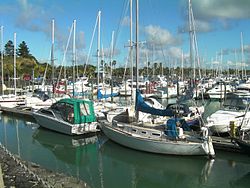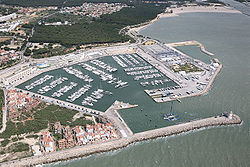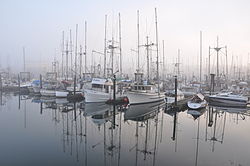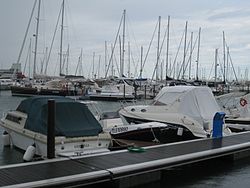- Marina
-
- For other uses of this word, see Marina (disambiguation).
A marina (from Sp. or It. "marina", coast or shore) is a dock or basin with moorings and supplies for yachts and small boats. A marina differs from a port in that a marina does not handle large passenger ships or cargo from freighters.
In the United Kingdom the word marina is also used for inland wharves on rivers and canals that are used exclusively by non-industrial pleasure craft such as canal narrowboats.
Contents
Emplacement
Marinas may be located along the banks of rivers connecting to lakes or seas and may be inland. They are also located on coastal harbors (natural or man made) or coastal lagoons, either as stand alone facilities or within a port complex.
Facilities and services
A marina may have refueling, washing and repair facilities, ship chandlers, stores and restaurants. A marina may include ground facilities such as parking lots for vehicles and boat trailers. Slipways (or boat ramps) transfer a trailered boat into the water. A marina may have a boat hoist well (a traveling crane) operated by service personnel. A marina may provide in- or out-of-water boat storage.
Fee-based services such as parking, use of picnic areas, pubs, and clubhouses for showers are usually included in long-term rental agreements. Visiting yachtsmen usually have the option of buying each amenity from a fixed schedule of fees; arrangements can be as wide as a single use, such as a shower, or several weeks of temporary berthing. The right to use the facilities is frequently extended at overnight or period rates to visiting yachtsmen. Since marinas are often limited by available space, it may take years on a waiting list to get a permanent berth.
Boat storage
Some marinas offer boat storage including rack storage and dry storage yards. Dry storage or dry stacking (as opposed to on-water storage) is mainly found in the USA and Europe.
Drystack boat storage stores boats vertically in rack systems up to four boats high. It extends the life of the boat by keeping the hull dry, provides storage at seasonal marinas, and allows for storage of smaller boats in marinas lacking wet slip capacity. Drystack is particularly useful out of season, and important where winter temperatures are cold enough for the water to freeze.
In dry storage, boats on trailers or dollies are stored on a hard surface, often in a fenced-in area.
Moorings and access
 This marina in Beachlands, New Zealand has yachts in rows as well as ferryboat service to the central business district of Auckland.
This marina in Beachlands, New Zealand has yachts in rows as well as ferryboat service to the central business district of Auckland.
Boats are moored on buoys, on fixed or floating walkways tied to an anchoring piling by a roller or ring mechanism (floating docks, pontoons). Buoys are cheaper to rent but less convenient than being able to walk from land to boat. Harbor shuttles (water taxis), may transfer people between the shore and boats moored on buoys. The alternative is a tender such as an inflatable boat. Facilities offering fuel, boat ramps and stores will normally have a common-use dock set aside for such short term parking needs.
Where the tidal range is large, marinas may use locks to maintain the water level for several hours before and after low water.
Economic organization
Marinas may be owned and operated by a private club, especially yacht clubs — but also as private enterprises or municipal facilities. Marinas may be standalone private businesses, components of a resort, or owned and operated by public entities.
See also
Categories:- Marinas
- Nautical terms
Wikimedia Foundation. 2010.



